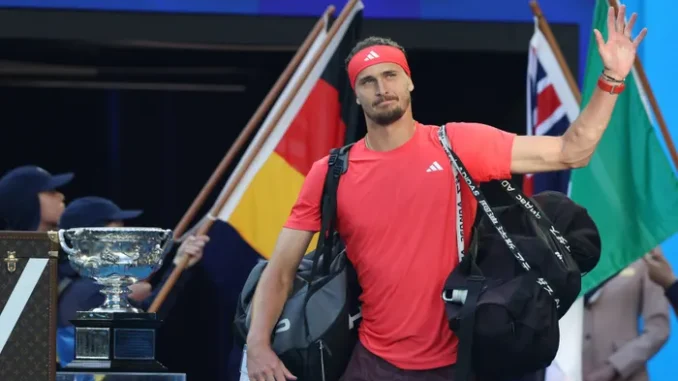
In the high-stakes world of professional tennis, few narratives are as compelling as the pursuit of a Grand Slam title. For Alexander Zverev, the German tennis prodigy, this pursuit has been fraught with near misses and mounting pressure. His recent defeat in the Australian Open final against Italy’s Jannik Sinner has intensified discussions about his elusive quest for a major championship.
Zverev’s journey to the Australian Open final was marked by determination and skill. However, the final match saw him succumb to Sinner in straight sets, 6-3, 7-6 (7-4), 6-3. This loss marked Zverev’s third appearance in a Grand Slam final without securing the coveted title. Reflecting on his performance, Zverev candidly admitted, “I simply wasn’t good enough.” This acknowledgment underscores the psychological and physical hurdles he faces in his quest for Grand Slam glory.
The German press has not been lenient in their assessment of Zverev’s performances. A prominent journalist remarked that Zverev “always finds excuses in Grand Slams,” suggesting that he has taken a “step back” in his career progression. Such critiques highlight the growing impatience and high expectations from his home country, which has not celebrated a men’s Grand Slam champion since Boris Becker’s triumph in 1996.
Zverev’s Grand Slam journey has been a series of near victories and unexpected defeats. In the 2020 US Open final, he was on the brink of victory with a two-set lead against Dominic Thiem, only to see the match slip away in a five-set thriller. Similarly, at the 2021 French Open, after securing the first two sets in the semifinal against Stefanos Tsitsipas, Zverev couldn’t maintain his momentum, eventually losing in five sets. These matches have become emblematic of his struggles to close out high-stakes games.
Beyond the on-court challenges, Zverev has faced personal controversies that have cast a shadow over his career. During his runner-up speech at the Australian Open, he was heckled by a spectator referencing past domestic abuse allegations made by former partners Olga Sharypova and Brenda Patea. Zverev has consistently denied these allegations, but the incident underscores the external pressures and distractions he contends with as he strives for his first Grand Slam title.
The competition within men’s tennis has grown increasingly fierce, with emerging talents like Jannik Sinner and Carlos Alcaraz making significant strides. Sinner, at just 23, has already secured three Grand Slam titles, solidifying his position at the pinnacle of the sport. His recent victory over Zverev not only showcased his exceptional skill but also highlighted the widening gap between Zverev and the sport’s current leaders.
Despite these setbacks, Zverev remains a formidable presence on the ATP Tour. He has achieved notable successes, including winning the ATP Finals twice and securing an Olympic gold medal in Tokyo. These accomplishments demonstrate his capacity to perform at the highest levels, albeit outside the Grand Slam tournaments.
The question that looms large is: What hinders Zverev from translating his undeniable talent into Grand Slam success? Some analysts point to his performance under pressure, suggesting that the weight of expectations may impact his play in critical moments. Others highlight technical aspects of his game, such as his second serve, which has been inconsistent in high-pressure situations.
Comparisons have been drawn between Zverev and other tennis greats who faced early Grand Slam disappointments. Legends like Ivan Lendl and Andre Agassi both lost their initial three Grand Slam finals before eventually breaking through and amassing multiple major titles. These precedents offer a glimmer of hope for Zverev and his supporters, illustrating that early setbacks do not preclude future triumphs.
Zverev’s path forward requires introspection and adaptation. He must address both the mental and technical facets of his game to overcome the barriers that have thus far impeded his Grand Slam ambitions. This includes refining his serve, enhancing his mental resilience, and perhaps most critically, silencing the internal and external voices of doubt.
The tennis world watches with bated breath, eager to see if Zverev can fulfill the promise that his early career heralded. His journey serves as a compelling narrative of talent, adversity, and the relentless pursuit of excellence. As he continues to compete, each match offers an opportunity for redemption and the chance to etch his name alongside the legends of the sport.
In conclusion, Alexander Zverev’s quest for a Grand Slam title is emblematic of the broader challenges athletes face in translating potential into achievement. His story is a testament to the thin margins that separate victory from defeat and the complex interplay of skill, psychology, and circumstance in the world of professional sports. Whether he can overcome these challenges remains to be seen, but his journey thus far has undeniably added a rich chapter to the annals of tennis history.
Leave a Reply